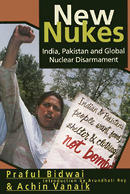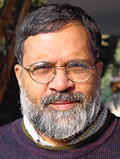 |
January 2, 2003Musharraf's Speech Raises the Nuclear DangerIf Pakistan's president, General Pervez Musharraf, wanted to send a shiver down the spine of the international community, and remind it that South Asia still remains the world's most dangerous place, he could not have done so more effectively than he did last Monday while addressing Air Force veterans in Karachi. Gen Musharraf said he last year "personally" conveyed a clear "message" to Prime Minister Vajpayee, "through every international leader who came to Pakistan", namely, that Indian troops "should not expect a conventional war from Pakistan" if they "moved a single step across the international border or the Line of Control". This is a major departure not only from Pakistan's stated nuclear doctrine, but even from Musharraf's own statement last April in an interview to Der Spiegel that he would use nuclear weapons only when the whole of his country "faces the threat of being erased from the map [of the world]". Islamabad can now threaten a nuclear attack even in the very first stages of a military conflict, not when it is about to be overrun in a conventional attack. With Musharraf's statement, and New Delhi's condemnation of it as "highly dangerous, irresponsible and provocative", South Asia has slid into yet another exchange of hostile military rhetoric. Worse, India and Pakistan are embarking on programmes to close the gap between the manufacture of nuclear weapons, and their induction into the armed forces and actual deployment. All this dangerously lowers the threshold for a nuclear conflict between the two rivals. Having made the "disclosure" on December 30, the Musharraf government soon embarked on a damage limitation exercise. Pakistan's defence spokesperson Maj Gen Rashid Qureshi that very night "clarified" that by the reference to "unconventional war", "the President only meant unconventional forces and not nuclear or biological weapons …" It is true that Musharraf did not explicitly use the words "nuclear weapons" or weapons of mass destruction in his Karachi speech. But then, historically, nuclear threats have been generally made not through overt, explicit references to nuclear weapons, but through warnings of "horrible" or dire consequences, etc. Qureshi then put more spin on this by saying it is not the use of nuclear weapons, but a popular uprising in Pakistan and Kashmir against India and the "encircling" of Indian forces, that would make the war in question "unconventional". This "clarification" is unlikely to convince many people in the wider world, given both the context that Musharraf was referring to – the 10-month-long post-December 13, 2001, eyeball-to-eyeball confrontation at the border – , as well as India's and Pakistan's hardening nuclear postures. It certainly won't convince Musharraf's most important adversaries – in India. The Indian government has responded to Musharraf's speech by declaring that it expected nothing better from Pakistan: "We have seen these reports and are not surprised. Pakistan has also earlier threatened use of nuclear weapons against India". More important, it let it be known that India was going ahead with the formal establishment of a Strategic Forces Command (SFC) this month. The SFC will manage and operate India's nuclear arsenal. The government has already selected a senior Air Force officer as the SFC's chief. New Delhi has also used Musharraf's nuclear "threat" as an argument for dismissing as "unrealistic" any possibility of a "meaningful forward movement" in relations with Pakistan. Only last week, it further tightened visa restrictions for Pakistani nationals. India is doing its utmost to torpedo any improvement in relations with Pakistan. It is easy enough to see through New Delhi's hypocritical but sanctimonious stand. Like Islamabad, it too has indulged in reckless nuclear threat-making. Indeed, it took the lead in crossing the nuclear threshold – first under the guise of a "peaceful" explosion, in 1974, and then overtly, in 1998. Again, it was India that a year ago initiated a massive military build-up at the Pakistan border, with the clear intention to punish Pakistan with war for its support to "cross-border terrorism", in particular the December 13 attack on India's Parliament House, for which it blamed Pakistan without detailed, clinching, proof. Commenting on the mobilisation, India's outgoing army chief S. Padmanabhan said on Monday: "We were absolutely ready to go to war. Our forces were well located but such a decision is ultimately a political decision." It is known – and confirmed by the conservative pro-Bharatiya Janata Party weekly India Today – that India and Pakistan were on the brink of a serious conventional conflict at least twice last year. In January and end-May/early-June, India drew up elaborate military plans for a conventional attack across the border. It called off these plans essentially under US (and to an extent, British) pressure. Yet, Padmanabhan all but dismissed the notion that it is Pakistan's nuclear capability which deterred India from going to war on those two occasions. He said, "When we assess our adversaries, we assess all [their] capabilities. We had evaluated it [the nuclear capability] and were ready to cope with it". Padmanabhan hinted that an "informal" nuclear command structure has already been in existence: "If it does not appear to be there, it does not mean it is not there. What is invisible today will become visible tomorrow". This is presumably the SFC. All this means that the threshold for an India-Pakistan nuclear confrontation has fallen to a new, dangerously low, level – probably lower than at any time during the Cold War after the Cuban missile crisis 40 years ago. India and Pakistan have proved cavalier and utterly irresponsible in repeatedly lowering that threshold. The unembellished truth is that both the Vajpayee and the Musharraf governments are acting under largely domestic compulsions and a certain set of frustrations at their inability to get the better of each other. Both India and Pakistan have witnessed rightward political shifts. In India, following state legislature elections in Gujarat – where the BJP won despite the terrible pogrom of 2,000 Muslims under its sponsorship last spring – , the Vajpayee government is under growing Hindu-fundamentalist pressure to ratchet up the level of hostility with Pakistan. In Pakistan, the nominally civilian government faces pressure from a rejuvenated Islamic right. The Vajpayee government feels bitter that it could not get Pakistan to completely stop supporting secessionist militants in Kashmir – despite the recent costly military mobilisation and India's energetic lobbying with the US. The Musharraf government too feels frustrated that it cannot get India to talk on the "core dispute" of Kashmir, or even restore diplomatic relations, which were drastically curtailed after December 2001. This also explains the boasts by each of the two governments that it came out "the winner" in the recent border confrontation. Two months ago, India's defence minister George Fernandes made that claim, declaring the military build-up had achieved all "its principal objectives". Now, Musharraf has announced: "We have defeated our enemy without going into war … The enemy has withdrawn its forces and we are also withdrawing ours". In reality, both India and Pakistan lost billions of dollars in staging the globe's biggest military mobilisation since World War II, involving one million troops. Both imposed avoidable hardship and fatigue upon their armed forces by keeping them on high alert for long periods of time. Both sacrificed the lives of scores, if not a few hundreds of their own soldiers – in landmine blasts, shelling, and numerous accidents. (In India, the estimate is 300 armed personnel dead, and an unspecified number of civilians, along with serious injures, including loss of limb, to several hundreds, and the death of countless sheep, goats and cattle.) Neither gained a strategic advantage or political-diplomatic leverage on the other. One of the most nauseating aspects of such casual, cavalier exchanges of hubris-driven, boastful statements between the two nuclear adversaries is the tub-thumping reception they receive from the strategic "experts" and hawkish politicians. Nuclear sabre-rattling in South Asia fosters the irrational illusion that each nation is in some sense "prepared" and ready to counter the other's "nuclear" challenge, that nuclear wars are winnable, that there is some "protection" possible against mass-annihilation weapons. This is macho mythology, the most dangerous part of the pathological mystique associated with nuclearism. There are, can be, no victors in a nuclear war. Nuclear weapons are strategically irrational. They cannot protect soldiers, leave alone civilian non-combatants. Rather, they make unarmed civilians particularly vulnerable to mass-destruction attacks. The best "security" which nuclear weapons can provide is of a negative kind – based on fear, insecurity, balance of power, through so-called deterrence, itself a flawed doctrine. But deterrence can break down, leading to nuclear retaliation. However, nuclear retaliation is itself an act of senseless revenge, not of regaining security. There is no defence – military, civil or medical – against nuclear weapons. India and Pakistan are taking one more step in the direction of enhancing the nuclear danger in South Asia. Yet, the world community is unlikely to intervene in this region to counsel restraint and halt India and Pakistan's descent into a nuclear arms race. The US is preoccupied with Iraq and Al-Qaeda. Besides, it has itself set a negative example by legitimising nuclear weapons and setting its face against disarmament. The pressure for restraint will have to come from within India and Pakistan. In today's vitiated global and regional climate and jingoistic domestic politics, that is a tall order. Only a strong civil society initiative and a peace movement can alter this dismal situation. – Praful Bidwai
Please Support Antiwar.comAntiwar.com or
Contribute Via our Secure Server Credit Card Donation Form Your contributions are tax-deductible |
|
Praful
Bidwai is a New Delhi-based political analyst and peace activist,
a columnist with twenty-five Indian newspapers and co-author (with
Achin Vanaik) of New
Nukes: India, Pakistan and Global Nuclear Disarmament. He
shared the International Peace Bureau's Sean MacBride International
Peace Prize for 2000 with Vanaik. Archived Columns by Praful Bidwai Musharraf's
Speech Raises the Nuclear Danger Hindu-Nationalist
Victory in Gujarat Spells Trouble for South Asia A
North Korea-Pakistan Connection? De-escalation,
But No Thaw Yet Missile
Tests Foment New Rivalries India
In a Trap on Iraq Portents
From the Kashmir Polls A
Mysterious Attack Across the LoC Hiroshima
Under the Shadow of 9/11 Reducing
the Nuclear Danger Did
India Cry Wolf to Secure US Intervention? 'Missile
Man' as India's President The
Relevance of Détente |
Back to Antiwar.com Home Page | Contact Us |


